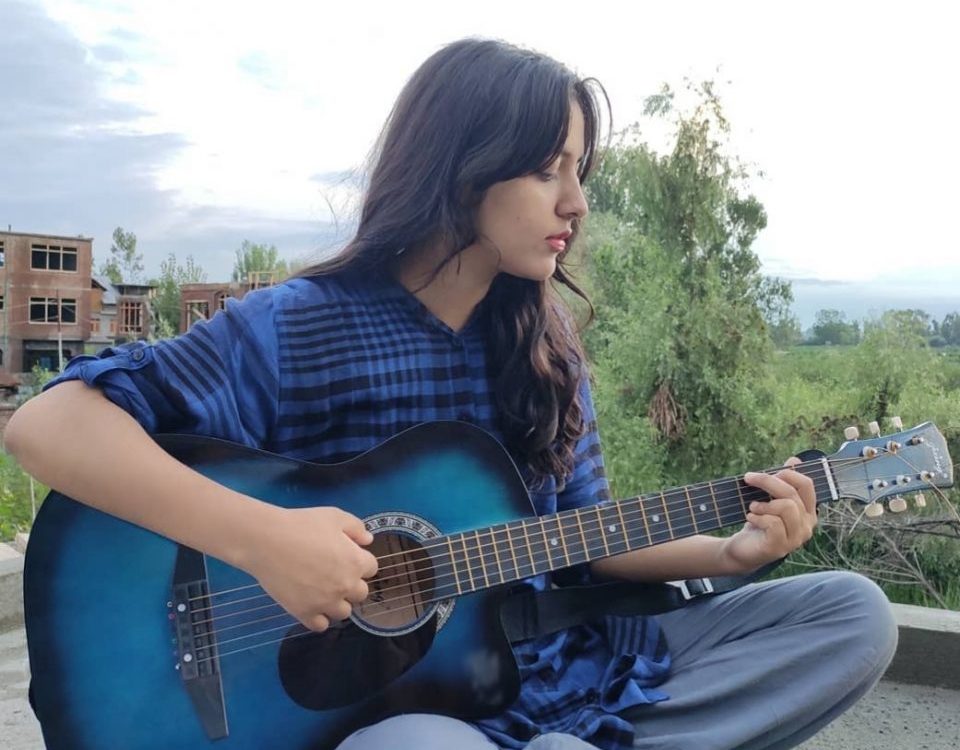
Meet Kashmir's millennials who strum, sing its traditional tunes to the world

For many decades the picturesque Kashmir Valley has inspired musicians and poets to compose romantic songs and write resistance poetry. But the Valley’s new breed of singers is pushing the envelope and diversifying the art of storytelling through creative musical notes and words.
Ali Saffuddin, a young vocalist from Rainawari area of Srinagar’s downtown, has become an instant hit with his trademark songs. This guitar-wielding song writer composes and sings in his mother tongue Kashmiri as well as in Urdu and English. Inspired by the Civil Rights Movement in the United States, Ali says he was also impressed by the “Anjuman Tarraqi Pasand Mussanafin” (Progressive Writers Movement) of the 1930s. Mehjoor and Faiz Ahmad Faiz are his all-time favourite poets in Kashmiri and Urdu respectively. And Mirza Ghalib of course!
Ali says there has been a revolution in music across the world and young musicians from the Valley are tapping into this trend by introducing folk music on global platforms.
Related news: She writes love songs to Kashmir, croons its unheard melodies
“We have witnessed a new wave of music. The music has been revolutionised in the West. All previous forms of cultural folk music are being celebrated in a renewed form now. In Kashmir, we are also experimenting with this genre of music,” he says.
“It had to happen because it is important to own your identity. It is important to know where you come from, and show respect to your cultural inheritance,” he adds.
Ali has been singing for the last five years and has performed on big stages outside Kashmir. His song Roakh Posh on YouTube has more than 6 million views and he has a reasonable fan following on several social media platforms.
“Like everything else, a musical journey is also an evolutionary process. As a student of music, I was always keen to listen to its various forms and from different cultures and continents. Many forms of music, including Jazz, Rock and Roll, Indian Classical and Sufi impress me. All these sounds from Central Asia, Turkey and Afghanistan melt in our part of the world, Kashmir. Historically, Kashmir has been a melting point of big cultures,” Ali says.
Kashmir is often referred to as Iran-e-Sagheer (prototype of Iran).
Ali who has a degree in mass communication and journalism currently works in the production section of a private radio station.
In his words, “the aim of the artist should not be limited to impressing the audience. An artist has a responsibility to talk about the pressing issues and contribute toward social reformation. Art is not limited to entertainment alone.”
A new video album that Ali and his colleagues have worked on will be released soon.
He released his single Asaan Gindaan (laughing and playing) in May this year.

After writing the opening lines of the song “Asaan gindaan ye pirvear sean shad roozin, sadaa roozin, ye aabshar ye sabzar ye sheenuk shehjaar pooshin” (In hopeful spirits and joy, let this alcove of Sufi saints remain, forever remain. The gushing waters, the meadows, the serene snow, may this last, last forever), it took him four years to complete the rest. The song was written with the aim to lift the spirits of the native Kashmiris after the prolonged civilian protest agitation in 2016.
The quality of art in many ways also determines the health of a society. Kashmir’s new-age singers and artists like Roushan Illahi aka MC Kash, a rapper, Mohammad Muneem Nazir (of the Alif band), Yawar Abdal, Mehmeet Syed, Raashid Jahangir, Kabul Bukhari and Waqar Khan are well known, but a 21-year-old Nargis Khatoon from Srinagar’s Alamgiri Bazar area is creating ripples with her melodious singing.
Born in 1999 in Jammu, Nargis lives in Kashmir and is currently pursuing her bachelor’s degree in business management. She writes romantic songs and aims to become a playback singer.
The love song written and composed by Nargis whose lyrics go as “Kya baarishou’n ki boondou’n main tum ho/ mere zehn main aah haqeeqatou’n main tum ho/Inn sarsarati hawaou’n main bhi tum ho /shayad meri dua’oun main bhi tum ho/ tum ho, tum ho, tum ho, tum ho, tum ho/jage hain nigahein kyoun/ hai khoyi si raatein kyoun/hai ankahi baatein kyoun/jagi hain hawayein kyoun/hai badli fazayein kyoun,” has become a hit on social media.
The young musician says the landscape of the Kashmir Valley provides a picture perfect setting for creativity, writing poems and songs, and for performing music.
Nargis has won accolades from the Pakistani artists and musicians like Ali Sethi and Ali Zaffar and from Indian Bollywood actress Sushmita Sen for her work. All of them shared her musical video on Twitter and wrote words of encouragement.
“Obviously, when all these big stars shared my song on their Twitter timelines it was big news for me. I felt good. It was a humbling experience,” the young Kashmiri singer says.
Related news: Meet Kashmir’s ‘Dussehra man’ who revives temples and holy caves
She is thankful to various social media platforms through which she has reached to audiences and her countless admirers even outside Kashmir. “Music has a language. And that language transcends boundaries.”
Nargis has been singing since her early childhood. She would sing at her school, too. She always knew that she sang well, but when she began performing on the stage her confidence started growing.
“I like to listen to the ghazals sung by Mehdi Hassan and Jagjit Singh. Both are incredible in their own way,” she says.
She, however, is confident that she wants to make a mark for herself and not emulate anyone.
Despite her social media fan base, Nargis is aware of the limitations of being an artist in a small place like Kashmir and wants to spread the word further.

